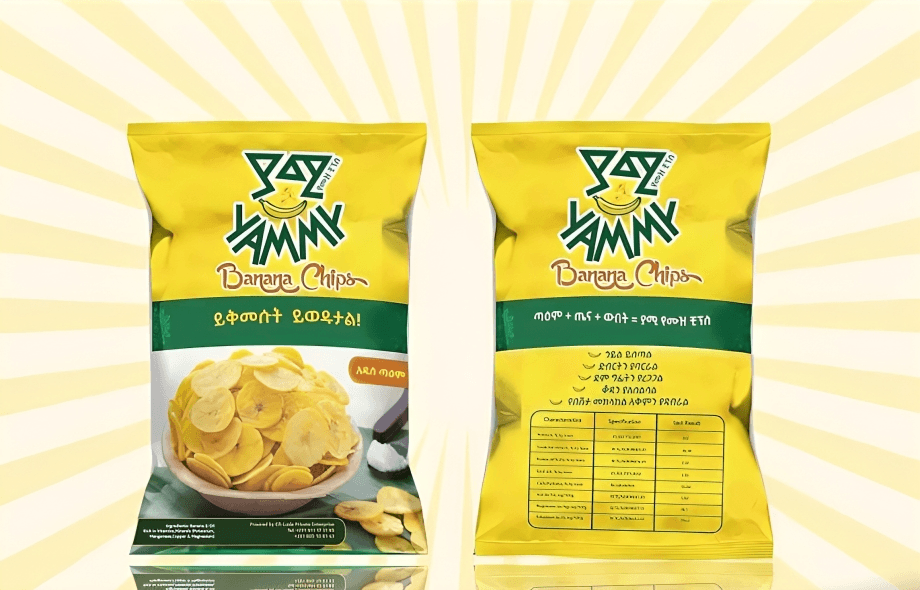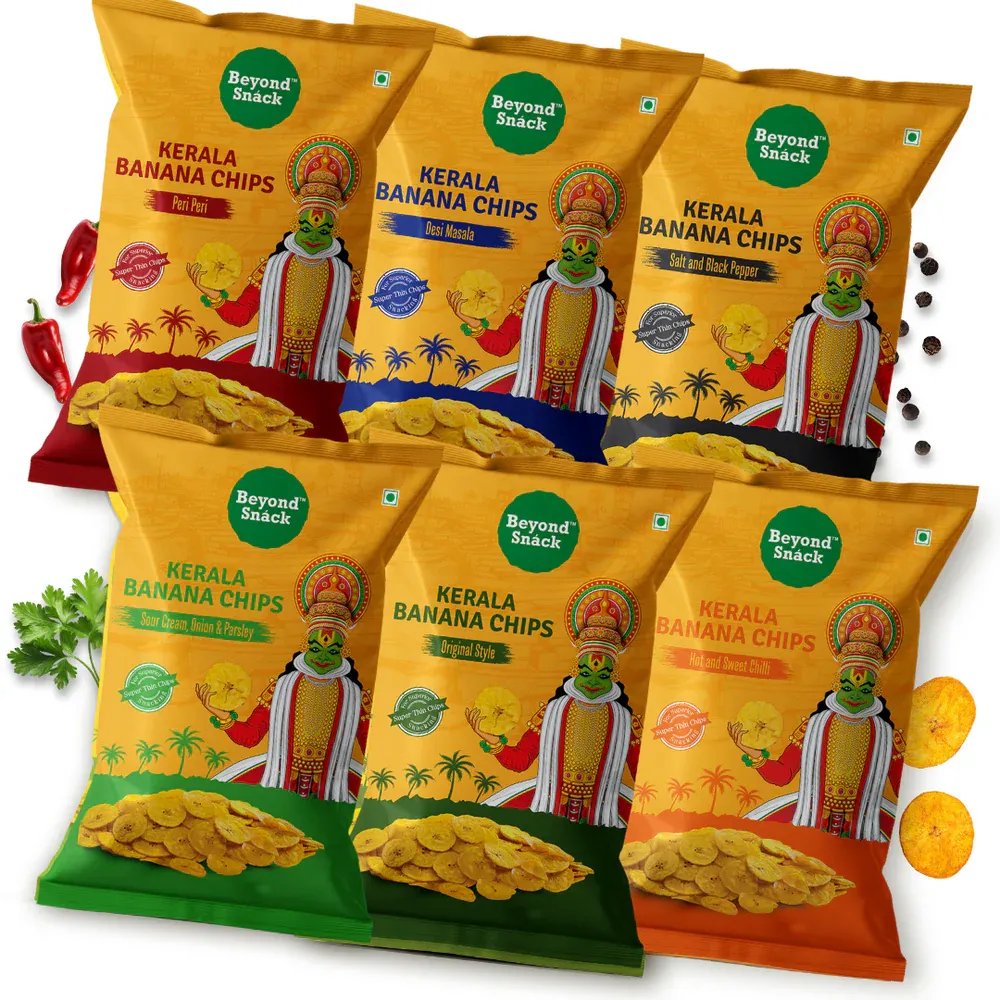Progress for 0 ad
Progress for 1 ad
Progress for 2 ad
Progress for 3 ad


Ana Mulatu
Addis Ababa, Ethiopia

More than a decade ago, Ephrem Debebe, a graduate of Haramaya University, traveled to Arba Minch for the first time. In the green lands of West Abaya, he was struck by a familiar yet overlooked sight: massive Giant Cavendish bananas left to rot in the fields. Too large for markets and too perishable to store, they stood unused.
“That’s when the idea first came to me,” Ephrem recalls. “We realized we could give them a second life instead of letting them go to waste; we could turn them into something healthy, tasty, and convenient.”
Much of Arba Minch, in southern Ethiopia, particularly the West Abaya area, produces an abundance of bananas, including the Giant Cavendish and other large cultivars often referred to locally as wild or semi-wild varieties. However, because of their size, limited market demand, and short shelf life, many of these bananas are not utilized and go spoiled, especially where transportation and storage infrastructure are weak.
Ephrem’s realization didn’t turn into a business overnight. For years, it remained an idea in search of a path. However, in May 2024, his long dream began to crystallize when he entered the Bruh Ethiopia Entrepreneurship Competition. His idea was to produce banana chips, a crispy snack made from thinly sliced bananas that are either deep-fried or dehydrated. Out of 30,000 participants, his company, Efi-Lude, won a $5,000 grant, finally giving him the resources to bring the idea to life.
Since then, Efi-Lude produces Yummy Banana Chips, though still on a small scale. The company makes 10 to 20 kilograms a day using locally assembled slicing and frying machines, a process that’s both slow and inefficient. The work, however, isn’t easy. Says Eprem. “To get one kilogram of banana chips, we use up to five kilograms of bananas,” Ephrem told Shega. “The machines waste a lot of raw material. Sometimes one out of four bananas doesn’t fry properly.”
Despite investing around 200,000 Birr in stainless-steel equipment and an additional 400,000 Birr of his own savings for labor and other expenses, Ephrem Debebe’s banana chip production remains low and inconsistent. He says locally made machinery wastes raw materials and limits output to just 10–20 kilograms per day.
Still, customers who’ve tried the banana chips appear to love them. “Early feedback has been encouraging,” Ephrem told Shega. “People love the natural taste and crunch, and they like that it’s a healthier alternative to other fried snacks.”
Academic research bolsters his claim: Ethiopian consumers are willing to spend significantly more on snacks that clearly offer health benefits, according to research conducted in the country’s southern regions.
Banana chips naturally have a long shelf life, often lasting months without preservatives, making them convenient for long-distance travel or emergency food storage. That durability adds to their appeal in a market where refrigeration and packaging infrastructure remain limited.
Banana chips are popular in southeast Asia, the Caribbean, and Latin America, where several prominent brands have established a strong market presence. In January of this year, Beyond Snack, an India-based, plant-based banana chip brand, successfully raised $8.3 million in its Series A funding round. The global banana chips market stands at $1.5 billion in 2025 and is projected grow to $2.04 billion by 2030, driven by the popularity of fruit-based snacks.

Although the global outlook is promising for Efi-Lude, the local market poses unique challenges. In Ethiopia, banana chips may initially seem unfamiliar to consumers who are accustomed to eating bananas raw. Given the country’s generally conservative eating habits, it may take time for the product to gain widespread acceptance even after mass production begins. Alongside Efi-Lude, other emerging local players such as Joy Banana are also entering the market.
Ethiopia’s snack market remains largely untapped. Beyond traditional bites like Dabo Kolo and Kolo, most shelf-ready snacks are imported, with limited local production.
The chips market is dominated by a few suppliers like Sun Chips, produced by Senselet (PepsiCo’s Ethiopian subsidiary), which uses potatoes as its base. But, given that most lie in the potato-based snack category, Ephrem sees a natural separation in sourcing: “We don’t compete for the same raw materials,” he says. By using wild banana, a resource largely wasted, Efi-Lude taps into a different value chain.
Ephrem believes this sourcing difference gives his product both cost and narrative advantages: “We’re turning what would have gone to waste into value.”
He also says that banana chips also bring a nutritional edge. Compared to potato chips, bananas offer higher fiber, potassium, and vitamins A and B6.
To expand production and meet demand, Efi-Lude is seeking a 17 million Birr loan through the Idea funding program, supported by the Commercial Bank of Ethiopia and the Development Bank of Ethiopia. The investment would allow the company to import new machinery and increase its production nearly 30 times more with an hourly production rate of 50 kilograms.
“Once we get the loan, we’ll be ready for full operation by the end of this year,” Ephrem says.
Regulatory approval is another key step. The Ethiopian Food and Drug Authority (EFDA) requires higher production volumes for certification, which the current setup cannot yet meet. “We’re working to scale up as quickly as possible so we can meet the EFDA’s standards and expand distribution,” he adds.
Support from government partners has been crucial. The Ministry of Labor and Skills provided seed funding, Bruh competition, and essential training in production management, marketing, and entrepreneurship. Meanwhile, the Kirkos Sub-City Job Creation and Industry Expansion Office granted Efi-Lude a small production shed and retail space, allowing Yummy Banana Chips to reach consumers directly.
Ephrem believes the combination of quality and local sourcing will set Yummy Banana Chips apart from competitors. The founder claims his 50-gram banana chip pack, priced at 30 Birr, offers more value than the 35-gram standard of most local chip brands. Beyond that, Efi-Lude is committed to educational marketing campaigns to demonstrate why banana chips are a good alternative.
👏
😂
❤️
😲
😠

Ana Mulatu
Ana Mulatu is an intern at Shega Media and a third-year student at Addis Ababa University. She is passionate about startups and works to help them increase their digital presence.
Your Email Address Will Not Be Published. Required Fields Are Marked *